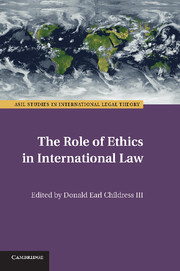Book contents
- Frontmatter
- Contents
- Contributors
- Acknowledgments
- Introduction
- Part one The Role of Ethics in Public International Law
- Part two The Role of Ethics in Private International Law
- 4 The Problem of Provenance: The Proper Place of Ethical Reasoning in the Selection of Applicable Law
- 5 Choice of Law as General Common Law: A Reply to Professor Brilmayer
- 6 A Reply
- 7 The Natural Law Challenge to Choice of Law
- 8 The Role of Ethics in U.S. Private International Law
- Part three Normative and Theoretical Perspectives
- Index
- References
8 - The Role of Ethics in U.S. Private International Law
Published online by Cambridge University Press: 05 December 2011
- Frontmatter
- Contents
- Contributors
- Acknowledgments
- Introduction
- Part one The Role of Ethics in Public International Law
- Part two The Role of Ethics in Private International Law
- 4 The Problem of Provenance: The Proper Place of Ethical Reasoning in the Selection of Applicable Law
- 5 Choice of Law as General Common Law: A Reply to Professor Brilmayer
- 6 A Reply
- 7 The Natural Law Challenge to Choice of Law
- 8 The Role of Ethics in U.S. Private International Law
- Part three Normative and Theoretical Perspectives
- Index
- References
Summary
Introduction
Globalization presents many difficult issues for United States courts faced with transnational legal problems. Chief among them is the fact that courts are not only called on to make complex decisions regarding the application of domestic law to transnational facts (a variation of the usual practice of a court in domestic cases), but are also tasked with making decisions regarding what effect, if any, foreign normative commitments (otherwise known as foreign law) are to be given in a domestic forum. Put more directly and concretely: In a case in which a United States court is asked to apply a foreign rule of law that is contrary to or conflicts with forum policies, what rule should be given effect – one chosen by the parties, one chosen by conflict-of-law standards, or one that the forum has articulated as just? In such situations, is a forum court obligated to apply forum law, in deference to the forum policies that animate that court's existence (such as the United States Constitution or local law), or is it free to apply some other law (whether foreign, chosen by the parties, or international) that takes account of the important international and party interests at stake in the court's decision?
Resolving this quandary raises questions that implicate the ethical dimension in law because a court must balance conflicting community norms – an “ethos” expressed in law – and determine which should govern. In making this choice, a court engages in ethical decision making by evaluating in a comparative fashion which laws or rules should guide it and choosing which laws effectuate the good in instant, fact-bound cases. By articulating what law should be applied based on rules of law to a given legal dispute, a court is an ethical decision maker – certainly not the only one or even the primary one, but one nonetheless. This is so because “the question ‘how should we organize our offices?’ cannot be answered in isolation from a discussion of the more basic question, ‘how is it best to live?’”
- Type
- Chapter
- Information
- The Role of Ethics in International Law , pp. 180 - 208Publisher: Cambridge University PressPrint publication year: 2011

